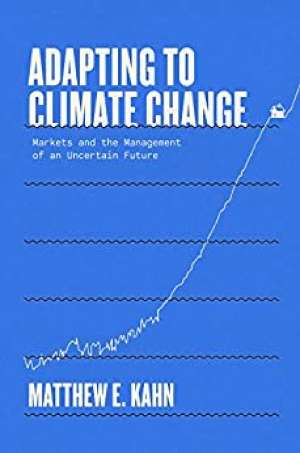29 November 2021
Adapting to Climate Change
Markets and the Management of an Uncertain Future
Matthew E Kahn
2021, Yale, 304 pages,
ISBN 9780300246711
Reviewer: Kevin Gardiner, Rothschild & Co/Cardiff Region Econ Growth Partnership

This is a timely, valuable and accessible contribution to the climate change debate by a US-based economics professor. After the frustrations and hyperbole at COP26 it offers a welcome reminder that mitigation is only one of the ways in which we can cope with the challenges ahead: adaptation may prove just important, perhaps more so.
Economic catastrophe is often the default assumption when discussing the environmental outlook, but “… no immutable cause-and-effect relation exists between climate conditions and economic outcomes” (p8). Kahn cites the Lucas critique: forecasts of the impact of climate change overlook the fact that we may recognise the threat and change our behaviour accordingly – and not just in the realm of emissions policy. Past correlations may not hold in the future.
Technology will respond with alternative energy supplies and productivity-enhancements; big data will inform infrastructure and agricultural development; better-informed and more complete insurance, real estate and human capital markets will help incentivise and facilitate changes.
Market forces will play an important role, but better-designed government policies are essential if those forces are to be as helpful as they can be. Climate change may be another tragedy of the commons, but Kahn suggests “we are not passive victims in the face of climate change” (p46).
The book is free of equations, but could benefit from a few charts and tables. The prose can be a bit clunky. Sentences such as “At any point in time, three age groups are alive: the young, the middle aged, and the old” (p54) are not helpful. References to an “asset loss” grate.
A more significant weakness is the book’s North American focus, which prevents me recommending it (even) more highly. There are too many references to air conditioning, which are both parochial and beg some obvious questions about electricity generation. More importantly, the painful economic questions posed by climate change are not primarily developed world problems (though we, of course, share responsibility for them).
The most significant adaptation to climate change would be for us to engineer a political mechanism for transferring significant real resources from rich to poor countries, in order to compensate them (in as economically efficient a way as possible) for the consequences of foregone carbon emissions. The adaptation challenges within poorer countries – relocation of people, agriculture, industry – will dwarf those faced by wealthier nations. In demonstrating the potential flexibility of the US, Professor Khan has set the hurdle low.
Nonetheless, in the author’s words: “This book revisits Julian Simon’s core hypothesis that human ingenuity plays a central role in reducing climate risk because our ability to adapt is accelerating over time.” It does this valuable job effectively. If readers go on to discover the late Professor Simon’s work, so much the better.
